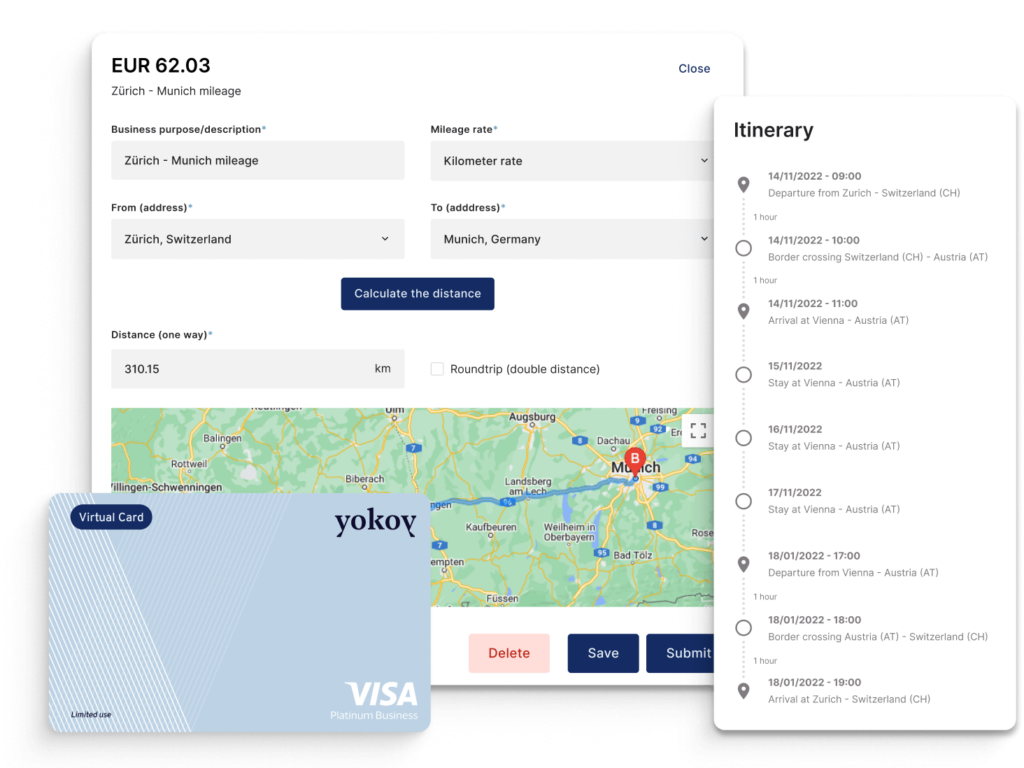Home / Travel for Business: Everything You Need to Know
Travel for Business: Everything You Need to Know
- Last updated:
- Blog

As the latest GBTA Business Travel Index Outlook report has revealed: Travel for business is on the rise again. The global business travel industry is poised to surpass its pre-pandemic spending level of £1.1 trillion in 2024 and is forecasted to reach nearly £1.4 trillion by 2027. This resurgence is highlighted by the robust growth seen in 2022, where global business travel spending surged by 47 per cent to £803 billion.
Key aspects of this accelerated rebound include the stabilising global economy and the significant progress made in overcoming the COVID-19 pandemic. The return of face-to-face meetings and in-person events, along with the recovery of international business travel capacity and volumes, has also contributed immensely.
Furthermore, there is a growing trend towards blending business and personal travel, with 62 percent of business travelers engaging in so-called bleisure travel, with 42 per cent adding perks like leisure days to their business trips. All this shows: As the industry adapts to evolving trends and challenges, businesses must remain agile and proactive in their approach to travel management and expense optimisation.
What is business travel?
As the wording suggests, travel for business is about employees undertaking journeys for work-related purposes. So far so good, but this also necessitates careful management and oversight of associated expenses. It involves the allocation of resources towards transportation, accommodation, meals, and incidental costs incurred during business-related trips. Effective spend management in business travel entails implementing policies, procedures, and technological solutions aimed at optimising resource utilisation, enhancing transparency, and ensuring compliance with organisational guidelines and regulatory frameworks.
Bleisure travel: How do you distinguish between business and private reasons?
The rise of bleisure travel represents a refreshing shift in the way we approach business trips. It’s no longer just about meetings and conferences; it’s about seizing the opportunity to combine work with leisure, personal growth, and exploration. We at Yokoy and our partner TravelPerk are paving the way for this new way of working by enabling you to easily distinguish between business and leisure. Here is what to consider:
Purpose of the trip: Business travel typically involves travel undertaken for work-related purposes:
business meetings and conferences
client visits
research
training sessions
Private travel, on the other hand, is for personal reasons, such as vacations, family visits, or leisure activities.
Documentation and booking: Business travel is often documented and arranged by the employer, the company’s travel agents or travel consultants, with clear objectives and itineraries outlined in advance. Private travel may involve personal arrangements and bookings, with no direct association with the employer or organisation.
Our tip: With platforms like TravelPerk integrated into Yokoy, planning a bleisure trip has never been easier. You can seamlessly book flights, accommodations, all while keeping track of your business itinerary.
Expense reimbursement: Expenses incurred during corporate travel are typically reimbursed by the employer or organisation, and there are usually specific guidelines and procedures for submitting expense reports. Private travel expenses are generally not reimbursed by the employer unless explicitly stated in the employment contract or policies.
Duration and activities: Business travel tends to have a defined duration and specific activities or meetings scheduled during the trip. Private travel may be more flexible in terms of duration and activities, allowing for leisurely exploration or relaxation.
Tax considerations: Business travel expenses may be tax-deductible for the employer and sometimes for the employee, depending on local tax laws and regulations. Private travel expenses are generally not tax-deductible unless they meet specific criteria outlined by tax authorities.
Can you extend a business trip with a few private days of vacation?
When extending a business trip to enjoy some extra days of vacation at your destination, it is essential to navigate the overlap between business and personal activities carefully. We recommend delineating between expenses incurred during the business portion of the trip and those related to personal vacation days. You and your employees should keep detailed records and receipts to facilitate accurate expense reporting and reimbursement.
Expenses directly related to business activities, such as car rentals, plane tickets or accommodation during work-related events, are typically eligible for reimbursement. Personal expenses, such as additional hotel nights or leisure activities during the vacation portion, are generally not reimbursable.
Tip: Be mindful of the tax implications of combining business and personal travel. Expenses directly attributable to business activities may be tax-deductible, while those incurred for personal vacation days are not. Therefore, the organisation should know about the employee’s travel plans. This way, any additional days off align with company reimbursement policies and also do not interfere with work obligations or commitments.
It should go without saying but we highlight it anyway: The team member’s travel itinerary should, of course, accommodate both business and personal activities seamlessly. Scheduling business-related meetings or events during the initial portion of the trip allows for sufficient time for relaxation or leisure activities afterwards.
Check out our newsletter
Don't miss out
Join 12’000+ finance professionals and get the latest insights on spend management and the transformation of finance directly in your inbox.
How business travel is changing
You probably experience it yourself: Business travel management is undergoing a transformative shift. There is a growing imperative for companies to prioritise sustainability in their travel practices, addressing environmental concerns and lowering their carbon footprint while enhancing profitability. Concurrently, the rise of remote work and increased employee mobility is reshaping traditional notions of workplace engagement. Embracing digitalisation and using advanced travel cost management tools and providers are pivotal in driving efficiency and cost-effectiveness, streamlining expense tracking, and optimising spend management processes.
Work from anywhere
The rise of remote work and flexible work arrangements has redefined the concept of the traditional office. With advancements in technology and communication tools, employees can effectively collaborate and conduct business from virtually anywhere in the world, for example in airport lounges, on business class flights with WiFi and in hotels. This shift allows for greater flexibility in travel arrangements, as employees may choose to work from various locations or travel while remaining connected to their teams and clients.
Tip: Check the country’s respective work regulations, permits and visas and also give employees a heads-up.
Corporate responsibility and sustainability
Nowadays, companies are under growing pressure to adopt sustainable business practices, including in their travel policies. This involves minimising the environmental impact of business travel by promoting alternatives such as virtual meetings, using eco-friendly transportation options, and offsetting carbon emissions. By incorporating sustainability into their travel strategies, your company can demonstrate your commitment to corporate social responsibility while also reducing costs associated with travel.
Economic efficiency
Business travel represents a significant expense for companies, encompassing costs such as transportation, accommodation, meals, and entertainment. In light of economic uncertainties and budgetary constraints, organisations are increasingly focused on optimising the efficiency and cost-effectiveness of their travel expenditures. This includes implementing measures to reduce unnecessary travel, negotiate favourable rates with travel vendors, and leverage technology solutions for expense management and reporting.
Digitalisation
The proliferation of digital technologies has revolutionised the way business travel is planned, booked, and managed. From online booking platforms and mobile applications to expense management software and virtual collaboration tools, digitalisation has streamlined and automated various aspects of the travel process. Companies can now seamlessly book flights, reserve accommodations, track expenses, and communicate with colleagues and clients in real time, enhancing productivity and efficiency while reducing administrative burdens.
Automation
Automation plays a tremendous role in streamlining and optimising the management of business travel expenses. By automating processes such as expense reporting, reimbursement, and approval workflows, companies can eliminate manual tasks, reduce errors, and expedite the reimbursement cycle. Solutions such as AI-powered expense management platforms can automatically categorise expenses, flag policy violations, and generate insightful analytics to help organisations make data-driven decisions and optimise their travel spending.
Yokoy Expense
Streamline your travel and expense management
Say goodbye to manual data entry, lost receipts, and complicated reimbursements. Yokoy handles everything from start to finish, for simple T&E management at any scale.

Keeping spend in check as you travel for business
By proactively monitoring expenses throughout the journey, you can prevent overspending and ensure accurate reimbursement processes. One efficient method is to utilise digital tools to capture receipts, such as taking photos with a smartphone or using expense management apps. By promptly recording expenses as they occur, you can establish a clear audit trail and facilitate the reimbursement tasks upon your return.
Furthermore, maintaining awareness of expenses in real-time allows for better decision-making and budget management during the trip. By monitoring spending patterns, you can identify areas where adjustments may be necessary to stay within budget constraints and optimise resource allocation.
Common types of travel expenses
You should expect the following costs to incur for business trips. Therefore your team should take them into account for invoicing purposes:
transport costs
meals
vehicle mileage
hotels
insurance
parking fees
business phone calls
last-minute cancellation fees
Preparing for your business trip
Before embarking on your business journey, every employee should take a moment to assess the necessity of the trip. It is worth questioning whether a face-to-face meeting is truly essential or if a virtual (video) call could suffice as a viable alternative. Moreover, there may be team members who do not necessarily need to participate. Shortening the attendee list to include only essential personnel can minimise expenses and optimise the effectiveness of the trip.
When planning your travel logistics, compare various options to identify the most cost-effective and efficient means of transportation. Whether it is car rental, plane or rail travel, selecting the right mode of transportation can significantly impact the overall budget and success of the trip.
Your account manager should determine how travel-related costs will be paid, particularly whether corporate cards will be utilised. This ensures consistency and compliance with company policies, streamlining the reimbursement process and minimising administrative overhead.
To maintain financial discipline, it is also advisable to set clear spending limits for various expense categories. By establishing predefined thresholds, you can prevent overspending and ensure adherence to budgetary constraints.
Finally, provide comprehensive training to traveling employees on how to accurately record and report travel expenses. Ensuring that employees are well-versed in expense management procedures minimises errors and streamlines the reimbursement process.
How to automate your business travel expenses with Yokoy
Business trips can be stressful in itself, and dealing with detailed expense reports afterwards only adds to the burden. Time that could be better spent following up on the trip and taking necessary next steps is often consumed by tedious administrative tasks. Yokoy offers a solution to alleviate this burden by automating expense management processes for you and your team.
With Yokoy, employees can effortlessly dispense with time-consuming expense reports. By implementing Yokoy’s intuitive platform into the management process, business expenses can be captured and recorded on the go, eliminating the need for manual entry of reimbursable receipts. Whether using virtual cards, physical cards, or personal cards, Yokoy streamlines payment processes and minimises administrative overhead.

Daedalean manages travel expenses with Yokoy & Travelperk
“Yokoy and Travelperk helped us with end-to-end travel expense management automation. Now employees easily book trips in Travelperk, and all data is sent to Yokoy in real time, with all compliance checks and VAT validation already in place.”
Yvonne Gross, VP of Finance & Operations, Daedalean

Yokoy supports you in adhering to local regulations
In addition to improving your expense tracking, Yokoy offers advanced features that further enhance efficiency and compliance with company policies. Areas such as automatic VAT reclaim save manual work and result in significant cost savings, especially for companies that do not reclaim VAT on travel receipts. Moreover, Yokoy provides auto calculation of Per Diem rates. This ensures accurate reimbursement rates based on local regulations and company policies.
Furthermore, Yokoy supports complex scenarios such as adding spend incurred as a company benefit to an employee’s payroll, particularly in countries like Germany and Austria where personal and social taxes apply. This functionality simplifies payroll processing and ensures accurate accounting for employee benefits.
Yokoy’s solutions in detail
Yokoy offers a comprehensive suite of features designed to streamline and optimise business travel expense management:
Travel expense management: From capturing receipts to categorising expenses and generating comprehensive reports, Yokoy ensures accuracy and efficiency every step of the way. With intuitive interfaces and seamless integration, employees can effortlessly track and reconcile their expenses, while finance teams gain real-time visibility and control over travel expenditure.
Smart corporate cards and lodge cards: Yokoy empowers organisations to take control of their spending with customisable card solutions tailored to their specific needs. These cards offer enhanced security features, such as spending limits and merchant restrictions, ensuring compliance and mitigating risk. Additionally, transaction data from these cards is automatically synced with Yokoy’s expense management platform, streamlining reconciliation and simplifying expense tracking.
Fully automated reimbursements: Yokoy automates tedious manual tasks by implementing advanced AI algorithms and machine learning. This way, you can automatically analyse and approve reimbursable expenses, frees resources and minimises errors. And: Employees no longer need to wait weeks for reimbursement, as Yokoy expedites the entire process, ensuring timely and accurate payments.
Next steps
Traditionally, managing business travel expenses was a cumbersome process that involved collecting physical receipts, manually sorting through them, and submitting them for reimbursement after returning from the trip. This manual approach often resulted in significant administrative burden and delays in processing reimbursements.
However, with Yokoy’s smart travel expense management solutions, travelers can capture receipts and record expenses in real-time, directly as the spending occurs. This means that there is no longer a need to hoard piles of paper receipts or spend valuable time sorting through them upon returning from the trip.
Do you want to experience, how Yokoy can minimise your administrative workload? Get in touch today to book a demo!
Simplify your invoice management
Book a demoRelated content
If you enjoyed this article, you might find the resources below useful.


